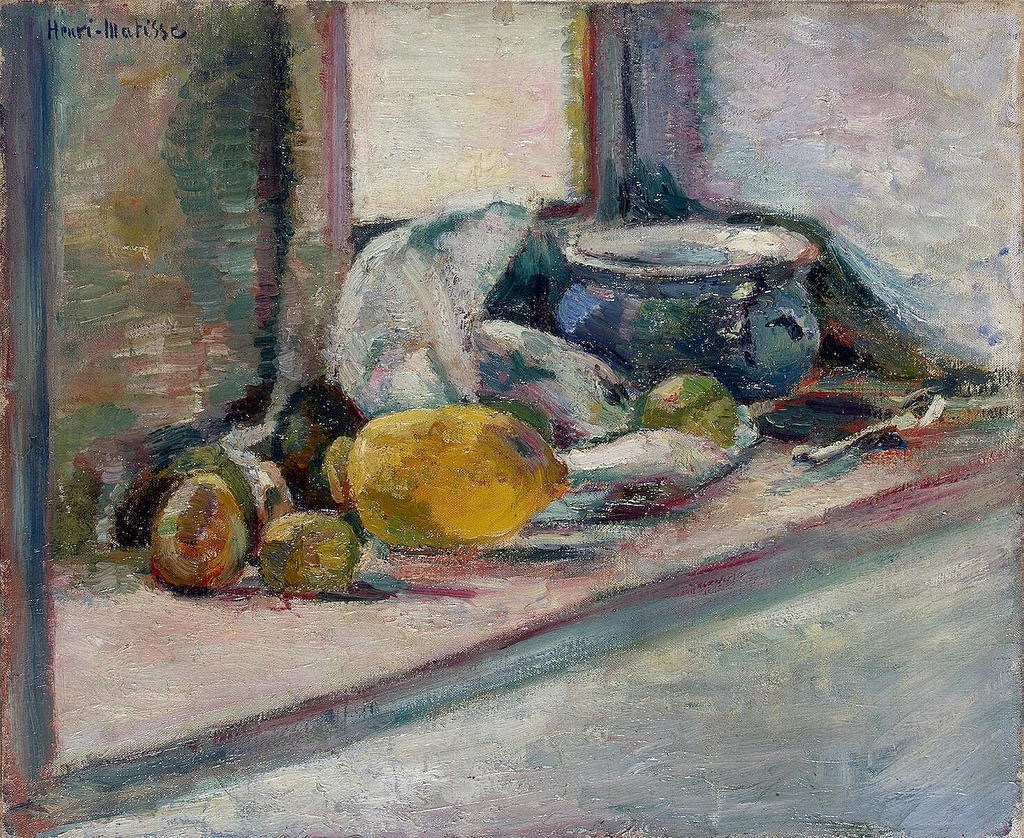ThePaintPotPrinciple

Henri Matisse: Blue Pot and Lemon (1897)
" … precisely what it always was and then some."
The Muse and I hired a professional painter for Our Grand Refurbish, both an expensive proposition and a priceless one. We'd never been ones to hire done our painting, figuring that we might just as well do that work ourselves and retain the wages we would have laid out. We never would have known what we would have foregone had we chosen to go that route, for one cannot notice what one does not experience. Following Kurt around has provided an education for me, exposure to much I never knew or understood about the fine art of house painting. It turns out to be every bit as exacting as anything Matisse ever produced, requiring deep skills in color, technique, and much more. For someone like me, a surface is a surface is a surface, but to Kurt, each one's a little different, demanding a unique approach. We've used a half dozen different primers alone on this job, each formulated for slightly different conditions, ones only an experienced eye might ever discern. After five months of learning, I'm catching on to much I still need to learn. I can't now imagine ever painting anything again without first at least seeking Kurt's wise advice and counsel, if not his paint brush. Oh, and I'm officially no slouch with a brush and a roller, myself. ©2021 by David A. Schmaltz - all rights reserved
I've been noticing how our master performs, though, like any first grader might notice in his first teacher. Kurt's not without his foibles. He tends to leave a trail of half-empty coffee cups and soda cans around the work area. I've taken to cleaning up before the work day starts, carting away those half-empties before they inadvertently get kicked over, which has happened more than once. Of course, a warm coke spilled on old linoleum which we're in the process of covering up doesn't amount to much, but the evident lack of attention irks me some. Such masterful execution combined with such apparent forgetfulness. A student tends to notice his teacher's paradoxes, for the student tends to first imagine their teacher a master, an elevated being, and only begrudgingly acknowledges their feet of clay. Every master has feet of clay. Perhaps the primary lesson taught every primary student amounts to: we're all human.
One pattern of Kurt's behavior, though, deeply surprised even this old shop-worn observer. I've come to call this ThePaintPotPrinciple. I've noticed that wherever Kurt first sets his paint, it tends to stay put, even when its location becomes inconvenient. I've watched as he worked a gauntlet between his surface and his paint source, ferrying brush load after brush load through an increasingly daunting no man's land until he'd finish painting. Then I noticed myself doing precisely the same thing out in my Pop-up Paint Shop. I'd find what seemed a perfectly fine place for my paint pot when I started painting a piece, and that pot would almost never leave that spot, regardless of how inconveniencing that original spot proved to become in practice. Paint pots seem magical. They apparently weave trances. I cannot find any other explanation for this phenomenon. It might well be universal.
I've noticed similar patterns when working in the kitchen. Some things there just seem sticky. Once placed, they never change places, regardless of how inconveniencing their original location becomes. The cutting board works like this. I tend to set it in the same place every time I use it, even if I have to cart what I cut there over to another counter with ample space for a cutting board. Any observer would probably conclude that this makes no sense. A process consultant would definitely make recommendations which, if followed, might start the fall of Rome or worse. I figure that this little paradox does not exist so that we might feel cleverer by fixing it. It's not, in fact, broken. It might violate preconceived notions about how the skilled operate, but those notions were probably not set after observing masters at work. Those notions might even exhibit internal consistency (shudder!), and thereby prove to be suspect and unbelievable to the more experienced. Grand Refurbishments do not operate like clockwork. Not even clocks do, anymore.
I believe that the finest lessons impart some fresh appreciation, some insight into the nature of something. So much of learning seems to require unlearning first, that one let go of what turned out to be childish expectations. Our Grand Refurbish undermined my prior notions of level, plumb, and perfect enough, encouraging me to become a bit more understanding and compassionate. Our Villa does what she can to please us but she does not seem to aspire to perfection. Neither should we. Or, we might most productively amend our childish notions about the nature of perfection. Who's to say that the way something natively is doesn't exhibit a perfection of its own, a perfection it's nobody else's business to critique and one that might pique some questions? ThePaintPotPrinciple serves as a principled performance, an example of something curious but ultimately beyond questioning. It is precisely what it always was and then some and therefore well worth appreciating.

